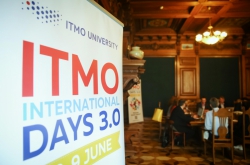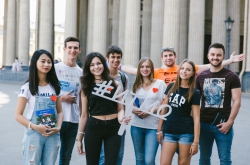Services for international students
It goes without saying that one of the key instruments for attracting foreign students are online platforms. Not only does ITMO University have many web resources of its own, it also has a page on the Ministry of Education and Science's official website for international students - studyinrussia.ru. The webpage contains information about the university, news, feedback from its students, and such things as photos and videos. ITMO University also maintains an active presence in Facebook.
When a student comes to study at ITMO University, he gets care and attention. Each week, anyone willing can participate in events dedicated to different cultures and nationalities; tours of St. Petersburg are regularly organized as well. There's also the Buddy Program that helps international students adapt better - Russian-speaking students overseee the newcomers and help them solve everyday issues. Another successful practice is “student ambassadors”. They participate in all of the university's international events, where they communicate with students from other countries and tell them about the first non-classical university and its values.
 ITMO University English portal
ITMO University English portal
English portal
The first things that international students, their parents, as well as international partners, employers and experts learn about a university is the information on its main English portal. ITMO's international website was launched a year and a half ago, and has already won several prestigious awards, including QS-APPLE and Russian International Affairs Council awards.
"How does one show those who've never been to our university that it's great? The international portal has a lot to do with that. Among other things, it is also the source of data that is used by experts who work on international rankings. Statistics show that an Internet user decides on whether he's interested in a website or not in just about 10 seconds, during which not only do you have to attract them, but also provide quick access to the data they seek. Also, as different kinds of people browse through our portal, we have to provide useful information for every one of them," comments Polina Petrusha, head of ITMO's Internationalization Office.
 Polina Petrusha
Polina Petrusha
At ITMO International Days, she gave advice on how to organize information on a university's international portal. To do that properly, one has to first find an answer to the following key questions:
№1: What will the website's structure be like? It can be a "landing" page, or a hub that has links to different subportals, or a single portal with many sections. It is essential that the user would have to do no more than three mouse clicks to find the necessary information, and the navigation has to be as simple as possible.
№2: What is the portal for? The portal is for attracting students. Thus, it has to contain all the information concerning application, educational programs, and university life, plus contact information. Yet, that is still not enough. There are numerous groups of users that form a university's international reputation: ranking agencies, the media, potential employees, opinion shapers in education and science. The better they are informed about the university, its strong sides and competencies, the more attractive is its brand on the international market. This, in turn, affects the students' choice. So, if one forgets one of those target groups, he or she loses points the university would have otherwise got.

№3: What should the portal be like? If a person likes the website, he or she starts to surf it. This is why information on the website should be comprehensible to a user, which is why one should avoid using "academic" English for its content. Using infographics, diagrams and step-by-step instructions is great for explaining information even to those who do not have a good grasp of English.
Ms. Petrusha also added that it's essential to add "live voices" of students and staff to the content - that can be different feedback, interviews or blogs.
During the second day of ITMO International Days, the participants also got a chance to learn about the German governmental student support program DAAD, discuss how tuition fees correlate with education's quality and ask professors from foreign universities about the peculiarities of studying abroad.





